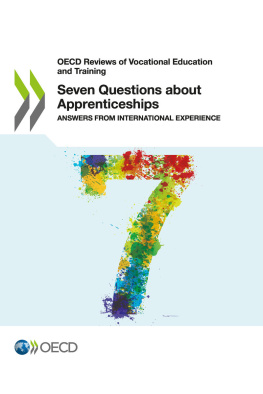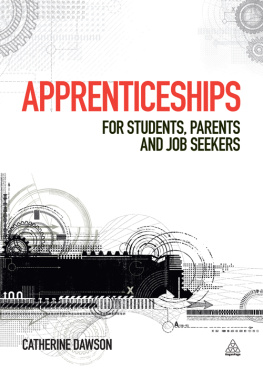OECD Reviews of Vocational Education and Training
Seven Questions about Apprenticeships Answers from International Experience
Please cite this publication as:
OECD (2018), Seven Questions about Apprenticeships: Answers from International Experience , OECD Reviews of Vocational Education and Training, OECD Publishing, Paris.
https://doi.org/10.1787/9789264306486-en
Metadata, Legal and Rights
ISBN: 978-92-64-30647-9 (print) - 978-92-64-30648-6 (pdf) - 978-92-64-30725-4 (HTML) - 978-92-64-30724-7 (epub)
DOI: https://doi.org/10.1787/9789264306486-en
Series: OECD Reviews of Vocational Education and Training
ISSN: 2077-7728 (print) - 2077-7736 (online)
This work is published under the responsibility of the Secretary-General of the OECD. The opinions expressed and arguments employed herein do not necessarily reflect the official views of OECD member countries.
This document, as well as any data and any map included herein, are without prejudice to the status of or sovereignty over any territory, to the delimitation of international frontiers and boundaries and to the name of any territory, city or area.
The statistical data for Israel are supplied by and under the responsibility of the relevant Israeli authorities. The use of such data by the OECD is without prejudice to the status of the Golan Heights, East Jerusalem and Israeli settlements in the West Bank under the terms of international law.
Photo credits: Designer things
Corrigenda to OECD publications may be found on line at: www.oecd.org/publishing/corrigenda .
OECD 2018
You can copy, download or print OECD content for your own use, and you can include excerpts from OECD publications, databases and multimedia products in your own documents, presentations, blogs, websites and teaching materials, provided that suitable acknowledgement of OECD as source and copyright owner is given. All requests for public or commercial use and translation rights should be submitted to .
Foreword
We live in a world where for too long, and in too many countries, vocational education and training (VET) has been the poor cousin of national strategies to provide young people and adults with the knowledge and skills they need and employers demand. That is why vocational education has often been seen as a provision fit only for other peoples children against the gold standard of academic routes culminating in university study. But evidence from countries with high performing vocational systems tells us that they provide a very effective means of integrating learners into the labour market and for opening pathways for further learning and personal growth - and there are signs that things are changing.
A new wave of interest has emerged in response to rising concerns over both stubbornly high levels of youth unemployment and the unpredictability of the modern working world. Increasingly diverse and interconnected populations, rapid technological change in the workplace and in everyday life, and the instantaneous availability of vast amounts of information mean that work that can be automated or digitised can now be done by the most competitive individuals or enterprises, wherever on the globe they are located. Knowledge and skills have become the global currency of the twenty-first century, with a rising premium on those social and emotional skills that are best learnt at the workplace. So across the globe, governments are turning afresh to VET and introduced programmes aimed at enhancing its attractiveness. They aim to improve progression from VET into either skilled employment or higher level learning by harnessing the unique capacity of the workplace experience to develop skills of genuine value.
This new report builds upon landmark OECD studies into upper secondary VET ( Learning for Jobs , 2010) and post-secondary provision ( Skills beyond School, 2014) to focus attention on apprenticeships as a uniquely important form of work-based learning. Rooted in real life workplaces, apprenticeships actively engage employers to ensure the value of skills development, but more needs to be done to ensure high-quality experiences. The aim of this report is to lift the bonnet on the design of effective apprenticeship systems. Addressing fundamental questions like the duration of an apprenticeship and how much an apprentice should be paid, the report provides a framework for policy makers and practitioners working across the world. This synthesis report follows six focused studies which were generously supported by Australia, Canada, Germany, Norway, Scotland (United Kingdom), Switzerland, the United Kingdom (Department for Education, England/UKCES, UK Commission for Employment and Skills), and the United States and the European Commission.
This is an important time for vocational education. It is now widely accepted that the skills that are easiest to teach and test are also the skills that are easiest to digitise, automate and outsource. VET systems must rise to the challenge of this changing landscape if they are to remain relevant to the needs of learners and employers. This study furthers our ability to conceptualise and make sense of the changes now being encountered, enabling confident responses to emerging challenges. Looking forward, new data, including further results from the OECDs Survey of Adult Skills (PIAAC) and Programme of International Student Assessment (PISA), will help countries to compare the extent to which they have succeeded in ensuring that VET emerges as an attractive opportunity for all learners.
 Andreas Schleicher, Director for Education and Skills, and Special Advisor on Education Policy to the Secretary-General OECD
Andreas Schleicher, Director for Education and Skills, and Special Advisor on Education Policy to the Secretary-General OECD
Acknowledgements
Throughout this study, the OECD Secretariat has received essential guidance and support from the Group of National Experts on Vocational Education and Training and Adult Learning, with a particular debt to the chair, Stefan Wolter, and vice-chairs, Johan Uvin and Katalin Zoltn.
The analytical work on individual modules leading to this report was funded through voluntary contributions from Australia, Canada, Germany, Norway, Scotland (United Kingdom), Switzerland, the United Kingdom (Department for Education, England/UKCES, UK Commission for Employment and Skills), the United States and the European Commission. Switzerland, Scotland (United Kingdom), the United Kingdom and the United States hosted workshops, which provided valuable input into the work.
Particular thanks is owed to national co-ordinators, who commented on the draft working papers and provided background information. These include: in Australia, Rochelle Ball, Pat Donaldson and Juliet Zeiler; in Canada, Genevive Babin, Marie Lavalle and Marie-France Chouinard; at the European Commission, Sigve Bjorstad and Mantas Sekmokas; in Germany, Oliver Diehl; in Norway, Benedicte Bergseng; in Scotland (United Kingdom), Tony Coultas; in Switzerland, Laura Antonelli, Paolo Bernasconi, Sarah Daepp, Marie-Laure Favre and Marlene Furrer; in the United Kingdom, Alison Morris; and in the United States, Johan Uvin and Sharon Lee Miller.















 Andreas Schleicher, Director for Education and Skills, and Special Advisor on Education Policy to the Secretary-General OECD
Andreas Schleicher, Director for Education and Skills, and Special Advisor on Education Policy to the Secretary-General OECD